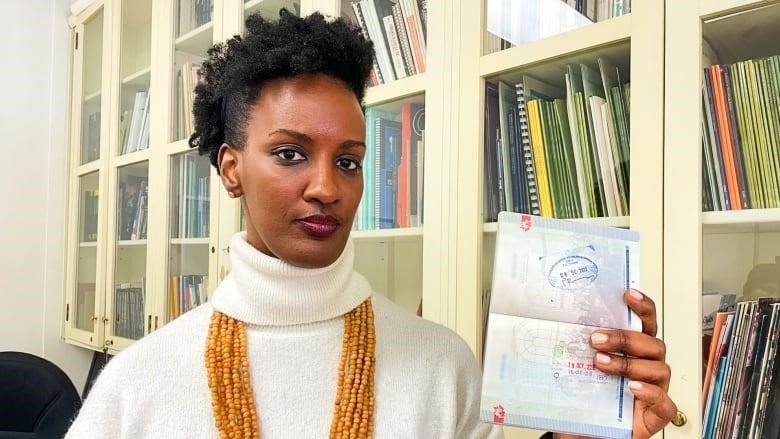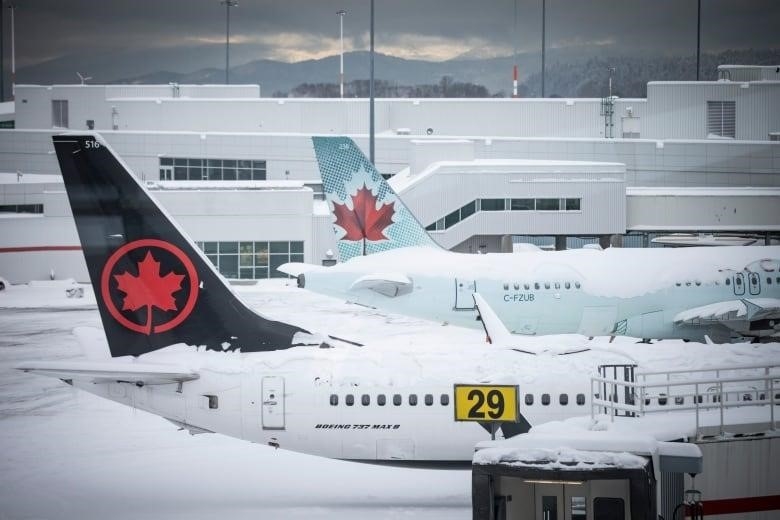
Since then, Air Canada has said sorry to Ketty Nivyabandi
After she was turned away from a flight to Mexico, the head of Amnesty International Canada accused Air Canada of racism and discrimination.
Ketty Nivyabandi is a permanent resident of Canada and has official refugee status. She was supposed to leave from the Ottawa International Airport on Thursday afternoon, but she said that when she went to check in, the Air Canada agent got confused by her travel documents. Nivyabandi said that she was going to a work conference in Mexico.
It’s not just me who has had this happen. It’s a pattern.– Ketty Nivyabandi
Nivyabandi is from Burundi, but when she travels, she uses a government-issued document for refugees instead of a Canadian passport. The Canadian government says that these documents are enough proof of a person’s immigration status and that they should be able to leave the country.
Nivyabandi says that the first agent she talked to didn’t seem to know that, though.
“He didn’t seem to have ever seen something like that before,” she said.
After talking on the phone with the agent, his manager, and then another agent, Nivyabandi said she was told she couldn’t get on the plane. Their reason was that she didn’t have a visa to go to Mexico.
Nivyabandi said that Canada’s permanent residents and refugees don’t need this kind of visa. She said that none of this was a problem when she flew with the same airline in October and took the same flight.
“I was shocked when I was told I couldn’t get on the plane and my bags were given back to me. I didn’t think that would happen at all, “she told me.
She asked Mexico’s embassy in Canada about it, which told her she was right.
“Permanent residents of Canada must show a valid passport or a Refugee Travel Document along with their Permanent Resident Card. [THEY] DO NOT REQUIRE A VISA, “Later that day, the embassy wrote in an email.
The same information can also be found on the website of the embassy.
“I was taken aback. I felt like a fool, “said Nivyabandi.
“Racial profiling as a systemic practice
Nivyabandi said that this isn’t the first time she’s had trouble entering or leaving the country, and she knows that she’s not the only one.
“It’s part of a pattern and a systemic pattern of racial profiling, of over-checking travelers who happen to be Black, happen to be from a religious minority, or happen to be refugees,” she said. “These people are automatically thought to be in the wrong.”
The Americas director for Amnesty International agreed. He said that what was going on was “outrageous and unacceptable.”
In a statement posted on the organization’s website, Erika Guevara-Rosas said, “We demand a public apology from the airline and reparation for the harm caused. This must include giving her a new ticket to fly as soon as possible.”
Rules ‘complex,’ says Air Canad
The money for Nivyabandi’s flight was given back to her. She changed her plans and was able to get on a more expensive flight on Friday.
The airline said it now “understands the rules better” and has apologized to Nivyabandi, but it still stands by the way it handled the situation.
“It is Air Canada’s policy to treat every customer with respect and courtesy,” the airline told CBC in a statement on Friday. “This is how we handled Ms. Nivyabandi’s situation at the Ottawa airport.”
Air Canada wrote that several agents worked hard to help Nivyabandi. One of the things they did was look at Timatic, which is a database kept by the International Air Transport Association. Airlines can use Timatic to find out about national entry requirements, such as whether or not a passenger is allowed to enter a country.
“These rules can be complicated and can vary from country to country, especially when a customer is traveling on a less common type of document, like a refugee document in this case,” Air Canada said, adding that airlines can be fined if they let people fly without the right papers.
“The information Timatic gave about the documents needed to travel to Mexico was not clear in this case,” Air Canada said. The airline said it is working with the service to make sure its information is correct and up to date.

Confusion rife, lawyer say
Immigration lawyer Jacqueline BonisteelShe said she can understand how hard it is for airlines to deal with rules that are complicated and involve more than one government.
Even though a refugee travel document is a valid and accepted form of ID, “the reality is that it isn’t accepted by every country, and traveling with it is usually harder than with a Canadian passport,” she said.
Bonisteel said that she often hears that airline workers are “confused” and “making calls that we think don’t follow the law.”
She said, “I think it’s just another example of the problems refugees face, and we need to look into it as best we can.”
“It’s not Canada’s rules, it’s the rules of the countries where people want to go. But maybe we could do more to make sure these problems don’t happen.”
Nivyabandi said she knows airlines have to follow the rules, but she thought what happened to her showed that these rules can be interpreted in different ways, which can put people like her in a tough spot.
Since then, she has reached out to the leaders of Air Canada to talk about bigger changes, such as training for employees on racial profiling and money for people who are wrongfully kept from boarding a flight.
“It’s not just me who has had this happen. It’s a pattern. It happens across the board, and so it requires a robust and systemic response,” she said.
